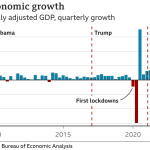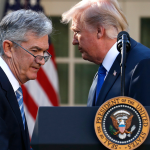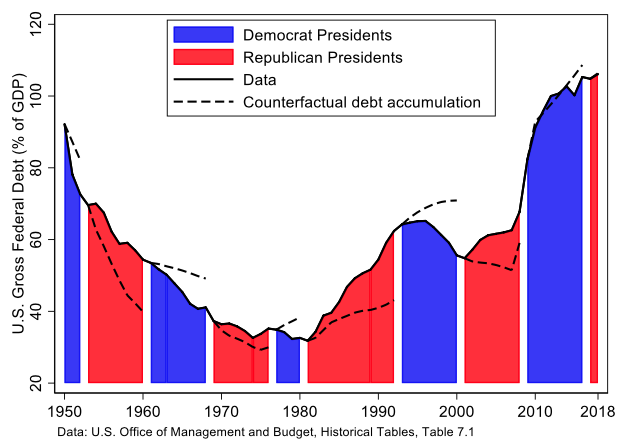Republican economic policies have historically shaped the landscape of American capitalism, reflecting a complex interplay of ideals that prioritize free-market policies and limited government intervention. Influential voices like economist Oren Cass have highlighted a drift from what many might consider traditional GOP economic orthodoxy, arguing that reliance on deregulation and unrestricted trade has hampered American workers. As the party has evolved, notions of economic libertarianism have taken root, often to the detriment of true worker empowerment. This shift has led to a growing recognition that a new approach to economic policy might be necessary to rebuild the American middle class and foster sustainable growth. By rethinking the foundation of Republican economic strategies, there is potential for revitalization that benefits not only businesses but also the everyday worker.
At the core of Republican fiscal approaches lies a rich history of free-enterprise principles that resonate with conservative values. While the GOP has long championed minimal government involvement in the economy, the ideas emerging from contemporary conservative thinkers like Oren Cass suggest a reevaluation of these priorities. The interplay between economic viewpoints, worker advocacy, and market freedom presents a significant crossroads for the party, with opportunities for redefining its stance on worker rights and economic growth. As younger leaders within the party embrace policies that intertwine traditional conservative foundations with new economic realities, the future trajectory of American economic policy remains open to innovative interpretations. This dialogue emphasizes the need for a balanced approach that prioritizes both freedom and the empowerment of workers.
A Critical Look at Republican Economic Policies and Their Evolution
Historically, Republican economic policies have shifted dramatically, moving from a focus on protecting American labor to prioritizing deregulation and free-market dogmas. Prominent economist Oren Cass argues that this shift represents a significant departure from the party’s roots. Republican presidents like Abraham Lincoln and Richard Nixon implemented measures that protected domestic industries, a practice that has largely been abandoned in favor of free-market policies that favor unchecked trade and deregulation. The focus of past GOP leadership was on strengthening workers’ rights and promoting wage growth, contrasting sharply with today’s emphasis on economic libertarianism, which often neglects the welfare of the workforce.
Cass highlights that the GOP’s allegiance to economic orthodoxy is not only flawed but detrimental to the American worker. He points out that the rise of economic libertarianism has led to stagnant wages and a widening trade deficit, highlighting that the current paradigm has failed to address the essential needs of American households. The resultant policies have prioritized cheap consumer goods over fundamental investments in labor, which contributes to a decline in the overall economic well-being of families across the nation. Therefore, a reevaluation of these policies is not just necessary but urgent, as the historical lessons indicate that robust, worker-centric policies yield stronger, more sustainable economic growth.
The Fallacy of Market Fundamentalism in Modern Republicanism
The rise of market fundamentalism, as critiqued by Cass, posits that an unregulated free market will naturally lead to prosperity. However, this belief is increasingly scrutinized, especially given the lack of positive results from such policies over the past few decades. Cass argues that this ideology misaligns the goals of economic policy with the actual needs of the populace. Historical figures such as Ronald Reagan, often lauded for their economic policies, enacted several measures that contradict the core principles that today’s libertarian-leaning Republicans purport to uphold, including tax increases and support for protective tariffs.
As this fundamentalist view of the market persists, it has led to policy outcomes that exacerbate wealth inequality and undermine the social fabric. By focusing strictly on consumption optimization, as articulated by Cass, these policies disregard their primary purpose: to empower workers and foster a vibrant, innovative domestic economy. The disarray among the Republican coalition, fragmented by differing priorities, has led to a lost opportunity for constructive economic reform that could genuinely uplift American workers and support strong family units.
Worker Empowerment: A New Republican Economic Vision
At the center of Cass’s argument for a refreshed Republican economic policy is the concept of worker empowerment. This notion counters the traditional GOP approach that has often sidelined workers’ needs in favor of corporate interests. By emphasizing the importance of a robust labor force, Cass envisions a shift towards policies that prioritize family sustainability and domestic production. This approach aligns with historical Republican practices, wherein leaders understood the value of a strong workforce as fundamental to national economic success.
The push for worker empowerment suggests that economic policies should not only aim to boost corporate profits but also reinforce the livelihoods of individual families and communities. As young conservative leaders embrace these ideas, there is a growing recognition that successful economic models must integrate the voices and needs of workers. Doing so would create a more resilient economy, thus challenging the status quo of economic libertarianism that has dominated recent Republican platforms.
Reaganomics Revisited: A Closer Examination
The legacy of Reaganomics remains a topic of heated debate, with scholars like Cass arguing that many principles attributed to Reagan stem from a misinterpretation of his policies. While renowned for advocating for free enterprise, Reagan’s economic measures, including tax increases and protectionist policies, were often at odds with the unyielding libertarian ideals that emerged post-Reagan. By revisiting these policies, it becomes evident that they were shaped by a context that emphasized not only growth but also stability and support for the American worker.
Cass illustrates that Reagan’s approach was multifaceted, often working to address the immediate needs of struggling Americans through government support rather than relying solely on market forces. This examination calls for a reflective rethinking of how modern GOP leaders celebrate Reaganomics, urging a return to a more balanced approach that considers the needs of both the economy and the workforce. By embracing this nuanced view, Republicans can recommit to fostering economic conditions that benefit all Americans rather than a select few.
The Disintegration of Conservative Coalitions and Economic Priorities
The fall of the Berlin Wall in 1989 marked a turning point for the Republican Party, leading to the disintegration of the ‘three-legged stool’ comprising social conservatives, economic libertarians, and foreign policy hawks. This fragmentation has significant implications for GOP economic policies, as Cass points out. Each faction began to vie for dominance, shifting priorities that once included worker welfare and domestic industry toward a narrow focus on deregulation and tax cuts. This scenario illustrates how the party’s historical economic lens has become obscured by a singular focus on free-market ideologies.
As these groups splintered, the influence of economic libertarians grew disproportionately, pushing policies that have often neglected the foundational goals of economic policy: supporting families and empowering workers. Cass contends that social conservatives, who initially held their ground on economic matters, began to realize the implications of this shift. The current economic landscape, marked by stagnation and increasing reliance on government assistance, underscores the urgent need for a realignment of Republican priorities that reconnects economic policies with the historical values of the party.
Navigating the Future: A Path Forward for GOP Economic Thought
As Oren Cass advocates for a revitalized Republican economic doctrine, he envisions a comprehensive reevaluation of existing frameworks to foster growth and sustainability for American workers. By critiquing the libertarian orthodoxy that currently dominates GOP economics, this new perspective seeks to balance market freedom with actionable support for families. This includes promoting policies aimed at job creation, worker training programs, and incentivizing domestic investment, reflecting the historical commitments of the Republican Party to its constituents.
Moreover, Cass asserts that future Republican policies must prioritize a diverse understanding of economic health, which encompasses not just GDP growth but also improvements in quality of life for working individuals. This holistic view acknowledges that the market’s role is not limited to generating profits but also extends to nurturing a strong, empowered workforce. In doing so, Republicans can forge a compassionate economic vision that resonates with the needs of today’s families and reinvigorates the party’s traditional values.
Lessons from History: The Importance of Economic Protectionism
The historical application of protectionist policies by figures such as Lincoln and Nixon underscores the importance of safeguarding domestic industries in times of economic upheaval. By focusing on nurturing and developing U.S. industries, Republican leaders of the past successfully supported economic growth while ensuring the livelihood of American workers. This approach, as highlighted by Cass, stands in stark contrast to the current policy landscape, which too often favors offshoring and deregulation at the expense of local economies and skilled labor.
Cass argues for a return to these principles, suggesting that Republicans should embrace a more protective stance that prioritizes the welfare of American workers over purely free-market doctrines. Implementing tariffs and promoting domestic manufacturing could create new opportunities for job growth and economic stability, aligning closely with the historical strengths of the Republican narrative. By revisiting these lessons, the GOP can reinforce its commitment to fostering a flourishing economy that truly benefits all Americans.
The Call for Reinvestment in Domestic Economies
In Cass’s view, a major recalibration of Republican economic policy is essential, particularly in advocating for reinvestment in domestic economies. The emphasis on globalization and offshoring has resulted in detrimental effects for working-class communities, where industry migration has led to a depletion of jobs and local economic decline. Hence, advocates like Cass insist on a renewed focus towards local enterprise and community investment that empowers workers and stabilizes job markets.
Reinvesting in local economies not only bolsters GDP but also enhances individual quality of life, reinforcing community resilience. By supporting domestic businesses and fostering innovation within local job markets, the GOP can create a sustainable economic model that addresses the issues stemming from years of neglect toward the American labor force. Such a transformative approach would signify a substantial shift in Republican economic strategy, aligning more closely with the foundational tenets of the party’s historical narrative.
Frequently Asked Questions
What are the core principles of GOP economic orthodoxy?
GOP economic orthodoxy emphasizes free-market policies that prioritize deregulation, lower taxes, and minimal government intervention in the economy. This approach seeks to stimulate economic growth by encouraging entrepreneurship and investment, believing that a thriving private sector ultimately benefits all citizens.
How do free-market policies relate to worker empowerment?
While free-market policies often focus on deregulation and reducing corporate taxes, recent discussions within the GOP highlight the importance of worker empowerment. This includes recognizing that strong labor markets, fair wages, and worker support contribute to a more robust economy. Policymakers are increasingly advocating for approaches that align economic growth with the welfare of workers.
Who is Oren Cass, and what is his view on Republican economic policies?
Oren Cass is an economist and founder of the think tank American Compass, known for critiquing traditional Republican economic policies. He argues that the GOP’s historical focus on deregulation and trade has overlooked the importance of building strong labor forces. Cass advocates for a shift towards policies that emphasize worker empowerment and the sustainability of American households.
What criticisms exist regarding the GOP’s adherence to free-market policies?
Critics, including economists like Oren Cass, assert that the singular focus on free-market policies has misjudged the economic needs of American households. They point to stagnating wages and increased reliance on government assistance as indicators that a more balanced approach is needed—one that factors in the welfare of workers along with traditional free-market principles.
How do economic libertarianism and Republican economic policies intersect?
Economic libertarianism, a strand of GOP economic thought, advocates for minimal government intervention and individual autonomy in market activities. While this aligns with traditional Republican ideals of free-market policies, there is a growing realization among some GOP members that economic libertarianism may not adequately address the needs of American workers, prompting discussions on integrating worker empowerment into their economic strategies.
What historical examples illustrate the GOP’s deviation from conventional economic policies?
Historically, figures like Abraham Lincoln and Ronald Reagan have demonstrated that Republican leaders sometimes deviated from strict free-market policies. For instance, Reagan implemented agricultural supports contrary to the minimalist government approach often attributed to his economic philosophy. Such examples indicate that the GOP’s economic practices have not always strictly followed modern interpretations of free-market orthodoxy.
What changes are occurring within the GOP regarding economic policies?
A notable change within the GOP is the rising influence of policymakers advocating for a fusion of traditional Republican values with worker empowerment principles. This shift seeks to address economic disparities and promote policies that not only spur growth but also enhance the quality of life for American workers, bridging the gap between conservative economic interests and progressive labor concerns.
How do tariffs fit into Republican economic policies historically?
Historically, tariffs have been used by Republican presidents to support domestic industries and protect workers. Leaders like William McKinley and Teddy Roosevelt employed tariffs as strategic tools to enhance American manufacturing. This approach contrasts with current free-market ideologies that often discourage protectionist measures, highlighting a broader discussion about the balance between free trade and worker protection in GOP economic policy.
| Key Points | Details |
|---|---|
| Historical Divergence | Republican presidents have historically not adhered to conventions of GOP economic policies predominantly focused on deregulation and free trade. |
| Oren Cass’s Critique | Founder of American Compass, Cass critiques the effectiveness of free-market policies and emphasizes the need for pro-worker economic strategies. |
| The Three-Legged Stool | Cass explains that Reagan’s coalition of social conservatives, economic libertarians, and national security hawks weakened over the years. |
| Economic Libertarians vs. Social Conservatives | The competition among factions led to a focus on low consumer prices rather than robust family-supporting labor growth. |
| Current Economic Reality | Despite rising per-capita GDP, American households experience stagnation in wages and increased reliance on government assistance. |
| Policy Recommendations | Cass argues that market dynamics should empower workers, support family stability, and promote domestic investments. |
Summary
Republican economic policies have evolved significantly over time, often diverging from traditional GOP principles. Economist Oren Cass argues that past Republican administrations failed to focus on empowering the workforce and have instead prioritized deregulation at the expense of American households. Cass’s viewpoints reflect a growing acknowledgment among right-leaning policymakers that economic strategies must shift towards fostering labor growth and addressing the realities faced by everyday Americans, rather than being tethered to outdated market orthodoxy.









